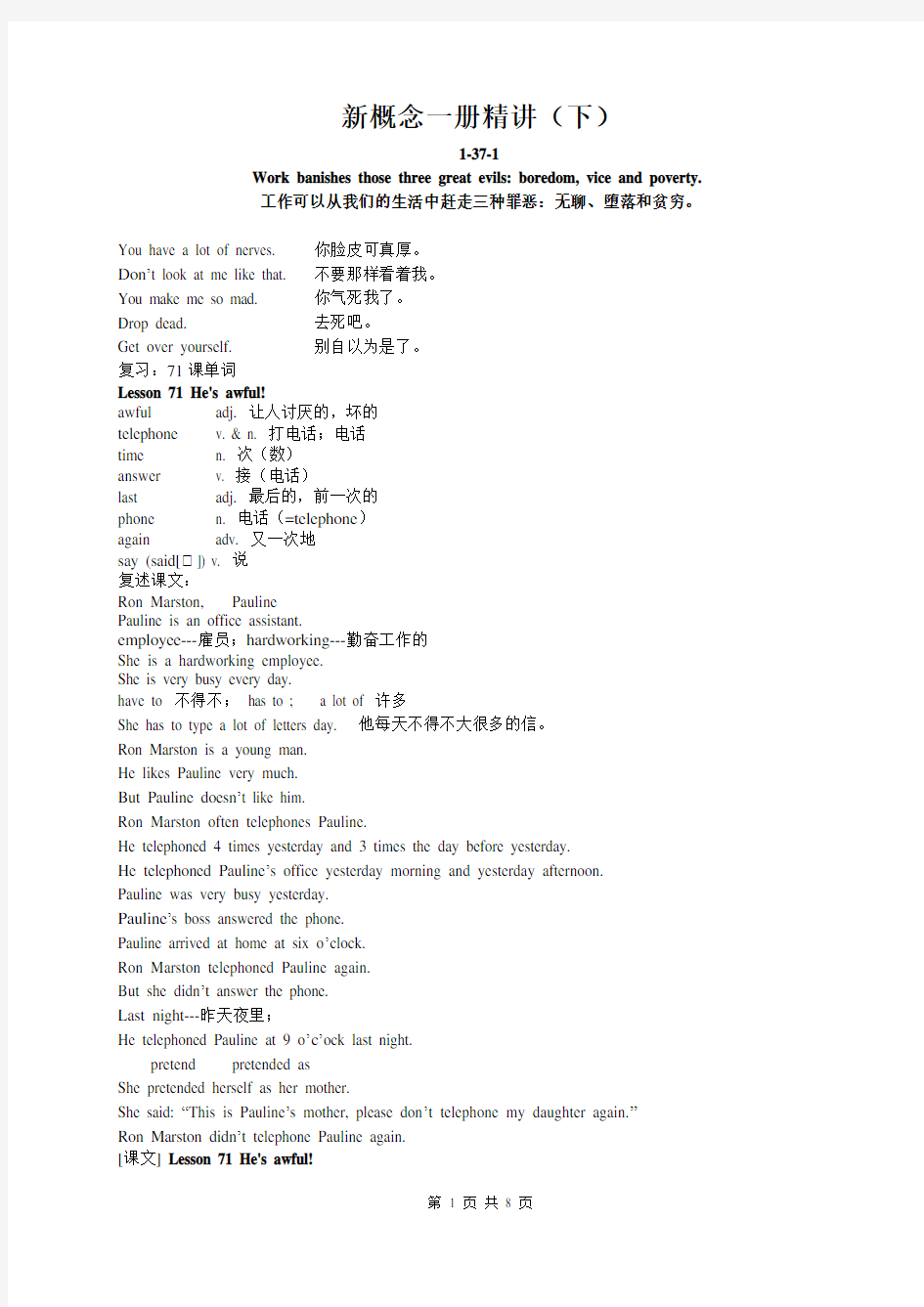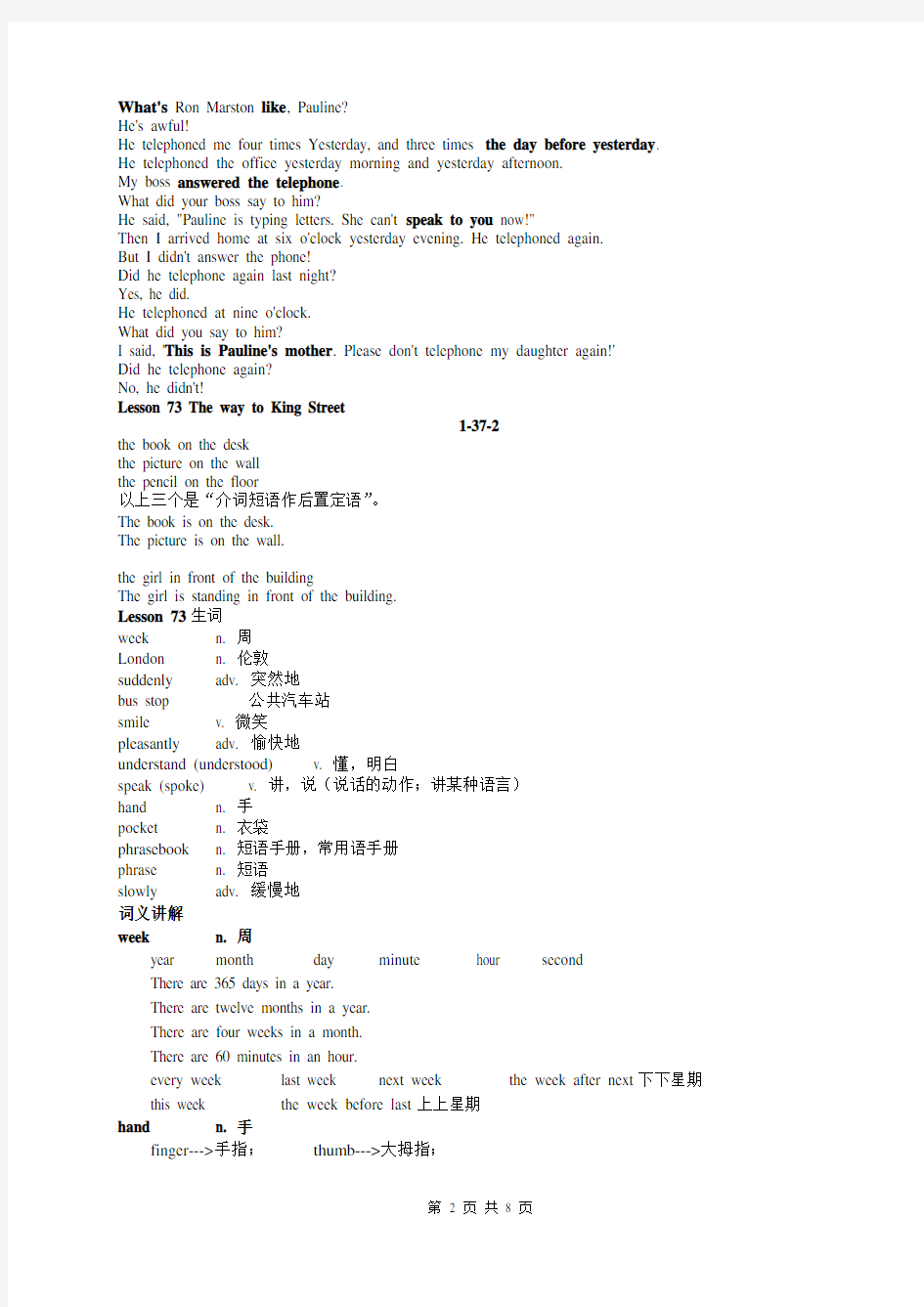新概念一册精讲笔记(下)


新概念一册精讲(下)
1-37-1
Work banishes those three great evils: boredom, vice and poverty.
工作可以从我们的生活中赶走三种罪恶:无聊、堕落和贫穷。
You have a lot of nerves. 你脸皮可真厚。
Don’t look at me like that. 不要那样看着我。
You make me so mad. 你气死我了。
Drop dead. 去死吧。
Get over yourself. 别自以为是了。
复习:71课单词
Lesson 71 He's awful!
awful adj. 让人讨厌的,坏的
telephone v. & n. 打电话;电话
time n. 次(数)
answer v. 接(电话)
last adj. 最后的,前一次的
phone n. 电话(=telephone)
again adv. 又一次地
say (said[ ]) v. 说
复述课文:
Ron Marston, Pauline
Pauline is an office assistant.
employee---雇员;hardworking---勤奋工作的
She is a hardworking employee.
She is very busy every day.
have to 不得不;has to ; a lot of 许多
She has to type a lot of letters day. 他每天不得不大很多的信。
Ron Marston is a young man.
He likes Pauline very much.
But Pauline doesn’t like him.
Ron Marston often telephones Pauline.
He telephoned 4 times yesterday and 3 times the day before yesterday.
He telephoned Pauline’s office yesterday morning and yesterday afternoon.
Pauline was very busy yesterday.
Pauline’s boss answered the phone.
Pauline arrived at home at six o’clock.
Ron Marston telephoned Pauline again.
But she didn’t answer the phone.
Last night---昨天夜里;
He telephoned Pauline at 9 o’c’ock last night.
pretend pretended as
She pretended herself as her mother.
She said: “This is Pauline’s mother, please don’t telephone my daughter again.”
Ron Marston didn’t telephone Pauline again.
[课文] Lesson 71 He's awful!
What's Ron Marston like, Pauline?
He's awful!
He telephoned me four times Yesterday, and three times the day before yesterday.
He telephoned the office yesterday morning and yesterday afternoon.
My boss answered the telephone.
What did your boss say to him?
He said, "Pauline is typing letters. She can't speak to you now!"
Then I arrived home at six o'clock yesterday evening. He telephoned again.
But I didn't answer the phone!
Did he telephone again last night?
Yes, he did.
He telephoned at nine o'clock.
What did you say to him?
I said, 'This is Pauline's mother. Please don't telephone my daughter again!'
Did he telephone again?
No, he didn't!
Lesson 73 The way to King Street
1-37-2
the book on the desk
the picture on the wall
the pencil on the floor
以上三个是“介词短语作后置定语”。
The book is on the desk.
The picture is on the wall.
the girl in front of the building
The girl is standing in front of the building.
Lesson 73生词
week n. 周
London n. 伦敦
suddenly adv. 突然地
bus stop 公共汽车站
smile v. 微笑
pleasantly adv. 愉快地
understand (understood) v. 懂,明白
speak (spoke) v. 讲,说(说话的动作;讲某种语言)
hand n. 手
pocket n. 衣袋
phrasebook n. 短语手册,常用语手册
phrase n. 短语
slowly adv. 缓慢地
词义讲解
week n. 周
year month day minute hour second
There are 365 days in a year.
There are twelve months in a year.
There are four weeks in a month.
There are 60 minutes in an hour.
every week last week next week the week after next下下星期this week the week before last上上星期
hand n. 手
finger--->手指;thumb--->大拇指;
fore finger / index finger--->食指
middle finger--->中指;ring finger--->无名指
little finger--->小指。
词组:on the other hand 另一方面
wave one’s hand 挥手
Yesterday, I went shopping and I saw some of my old friends in the street and they waved their hands to me.昨天我去买东西,在街上看到一些老朋友,他们朝我挥手。
raise one’s hand 举手
1-37-3
give sb. a hand 帮帮我(give me a hand 给我一只手;比help me要生动点)
read one’s hand 看手相
hand over 支出
hand in / out 上交作业,发作业
This is your homework for today, you must hand in your homework tomorrow.这是今天的作
业,明天必须上交。
Ask the monitor to hand out the homework.
pocket n. 衣袋,口袋
put 放置
put on 穿上
put into 放到里面
Put your hand into your pocket. 把你的手放到口袋里。=Put your hand in your pocket.
take--->拿take out--->拿出来
Take out your phrasebook.
Put your hand in your pocket and take out your phrasebook.
palm 手掌
nail:指甲
green hand:新手
shake hands:握手
give sb. a (big) hand:(热烈的)给某人鼓掌;帮助某人
pocket money:零花钱
词组:
know well:对……很了解
I know my father well.
She knows Hong Kong well.
She doesn't know London well.
say to oneself:自言自语
put into:把……放进……里面
take out:拿出……
He put his hand into his pocket, and took out a phrasebook.
Lesson 74 What did they do?
hurriedly adv. 匆忙地
cut(cut) v. 割,切
thirstily adv. 口渴地
go(went) v. 走
greet v. 问候,打招呼
复习:副词
副词有五种:
时间副词:yesterday, today, tomorrow, the day after tomorrow, the day before yesterday.
地点副词:here, there, upstairs, downstairs, home, downtown, abroad
程度副词:very, so, quite
频率副词:often, usually, always, sometimes, never(常用于形容词或副词的前面)
方式副词:
This is a beautiful bide. (beautiful修饰、限定名词---bird的作用)
The bird is beautiful. (本句是叙述鸟事怎么样)
形容词的功能:1.放在名词前面起修饰限定的作用。
2.放在be动词的后面起叙述的作用。
副词的功能:是起修饰动词的作用。
1-37-4
助动词:是一种帮助性的动词,它的功能就是帮助句子构成否定句或疑问句。不能单独作谓语。
must can do / does did
实义动词:有助动词的句子中的实义动词用动词的原形。
I can help you.
I must go home.
I go to work every day.
一般现在时变否定或疑问句时用助动词do或does.
I don’t go to work every day.
Do you go to work every day?
She goes to work every day. She doesn’t go to work every day.
Does she go to work every day?
did--->用于过去时。
I telephoned my mother yesterday.
I didn’t telephone my mother yesterday.
Did you telephone your mother yesterday?
及物动词vt.必须跟宾语。
不及物动词vi.不可以直接跟宾语,如果需要跟宾语后面要加介词。
英语中永远都不可能存在be + 动词原形的结构。
方式副词:
S + vi + (方式副词)
It is raining. 天正在下雨。
It is raining heavily.
S + vt + O + (方式副词) (O--->宾语)
I bought a book yesterday.
I saw some old friends in the street yesterday.
She greeted me. ---她跟我打招呼了。(greet--->打招呼)
She greeted me warmly. 他跟我热情的打招呼了。
1-38-1
方式副词的构成:
1.adj. + ly
warm--->warmly
slow--->slowly
quick--->quickly
My mother reads a story for me everyday.
My mother reads a story for me slowly everyday.
My husband always drives very quickly.
2.以辅音字母+ y结尾的形容词,把y变成i,再加ly。
lazy--->lazily
thirsty--->thirstily
She is a lazy employee.
She works lazily.
The children are very thirsty.
I gave them a glass of water.
They drank the water.----They drank the water thirstily.
3.形容词和副词同形
well--->well
hard--->hard (v.坚硬的hard rock硬石;adv.努力地)
late--->late (lately--->最近)
I’m well.
My mother speaks English very well.
She studies very hard.
She arrives home late.
Exercises A:
A look at this: 注意下面的句子
quick---quickly;thirsty---thirstily;careful---carefully
Example
She smiled ____. (pleasantly)
She smiled pleasantly.
Complete these sentences.模仿例句完成以下句子。
1.He read the phrase ____. (slow) slowly
2.He worked ____. (lazy) lazily
3.He cut himself ____. (bad) badly
4.He worked ____. (careful) carefully
5.The door opened ____. (sudden) suddenly
补充:shave---shaved;hurriedly---匆忙的;cut---切,割,砍;bad---坏的;badly---坏地My father shaved hurriedly this morning and cut himself badly.
1-38-2
take---拿took eat----吃ate
The boy took a cake and ate it quickly.
give---给gave drink---喝drank
I gave him a glass of water and he drank it thirstily.
meet---遇到met in the street在街上warm---热情的warmly adv.热情的
I met her in the street the day before yesterday and she greeted me warmly.
go went slow-缓慢的slowly-缓慢地
arrive arrived-到达late
The bus went slowly yesterday afternoon and we arrived home late.
Work worked hard-努力地
They worked very hard this morning.
Swim swam-游泳well adv. 好
We swam very well this afternoon.
Exercises B:look at this table 注意下表
He She We The bus does not know
read
smiled
went
shaved
drank
greeted
greeted
worked
enjoyed ourselves
a glass of water
the phrase
me
London
very hard
hurriedly
slowly
very well
thirstily
warmly
pleasantly
very much
Now write eight sentences.模仿下面例句,从上面的表格中选出恰当的词和词组,写出8句话。
Example: He read the phrase slowly.
He does not know London very well.
He read the phrase slowly.
He smiles pleasantly.
He saved hurriedly.
He drank a glass of water thirstily.
He greeted me warmly.
He worked very hard.
go--->went I went to New York last week.
Last week Mrs. Mills went to London.
know--->knew I know you very well.
I know London very well.
My father doesn’t know Hong Kong very well.
Mrs. Mills doesn’t know London very well.
lose--->lose lose one’s way---迷路
I often lose my way in Beijing.
So she lost her way in London.
1-38-3
see--->saw bus stop---公共汽车站,handsome---英俊的
I see a handsome man near the bus stop every morning.
Suddenly, she saw a man near a bus stop.
ask--->asked ask the way---问路
I can ask him the way.
say--->said say to oneself.---自言自语
She said to herself. I can ask him the way
tell--->told the way to king street
Can you tell me the way to king street please?
My grandmother told me a story yesterday.
There is a king in the mountain.
smile--->smiled The man smiled pleasantly.
understand--->understood I understand you.
The man didn’t understand English. He spoke German.
He was a tourist.
speak--->spoke
put--->put
take--->took
open--->opened
find--->found
But he put his hand into his pocket and took out a phrasebook. He opened the book and found a phrase.
He put his hand his pocket and took out a phrasebook, he opened the book and found a phrase, he read the phrase slowly.
I am sorry, I do not speak English.
Lesson 73 The way to King Street[课文]
Last week Mrs. Mills went to London. She does not know London very well, and she lost her way.
Suddenly, she saw a man near a bus stop. 'I can ask him the way.' she said to herself.
'Excuse me,' she said. 'Can you tell me the way to King Street, please?'
The man smiled pleasantly. He did not understand English! He spoke German. He was a tourist.
Then he put his hand into his pocket, and took out a phrasebook.
He opened the book and found a phrase. He read the phrase slowly. 'I am sorry,' he said. 'I do not speak English.'
词组:
know … well---->对。。。非常了解
lost her way 迷路
ask sb. the way 向某人问路
said to herself 自言自语
way to King Street 去国王街的路(介词短语作后置定语)
put … into 放到。。。里面
took out 拿出来
Lesson 74 What did they do?
hurriedly adv. 匆忙地
cut(cut) v. 割,切
thirstily adv. 口渴地
go(went) v. 走
greet v. 问候,打招呼
Lesson 75 Uncomfortable shoes 不舒适的鞋子
ago adv. 以前
buy(bough) v. 买
pair n. 双,对
fashion n. (服装的)流行式样
uncomfortable adj. 不舒服的
wear(wore) v. 穿着
1-38-4
宾语从句:一个句子作宾语。
是名词性从句的一类。
名词主要的句法功能:主语、宾语。
以名词teacher为例
I am a teacher. (主系表结构中)
The teacher is my mother. (teacher作主语)
I like the teacher.(teacher作宾语;主谓宾结构)
名词性从句可以分为三种:表语从句、主语从句、宾语从句。
宾语:由名词、介词担当。介词和及物动词后面有宾语。
Lesson 77 Terrible toothache 要命的牙痛
appointment n. 约会,预约
urgent adj. 紧急的,急迫的
till prep. 直至…为止
Lesson 79 Carol's shopping list 卡罗尔的购物单shopping n. 购物
list n. 单子
vegetable n. 蔬菜
need v. 需要
hope v. 希望
thing n. 事情
money n. 钱
1-39-1
